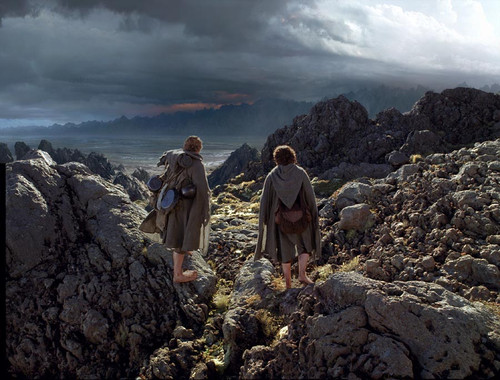
It is hard to ignore the volume of people in the Bible with wounds which were used for some end. God uses all sorts of people with all sorts of physical or spiritual maladies—people with limps in their legs , barren wombs, tragic diseases, and thorns in their sides. Similarly, look through the lives of Christians in the past and you are bound to discover wounds that never stopped bleeding in them. Flannery O’Connor had her lupus, Charles Spurgeon had his melancholy, Henri Nouwen had his loneliness, Samuel Rutherford had his grief. We each have particular wounds, but perhaps there is a wound that is common to us all.
I am (ideally) a quarter of my life through, and I have been thinking about this a lot lately. Why does it seem like there is no relief to certain longings of mine? Why is it that in my most meaningful and rich conversations with friends that I still find myself nostalgic over a conversation that was so recent? Why does loneliness exist in me even with really good friends at my side? Why do some days I feel immense joy in the mundane while others I feel an echoing emptiness? Why does it feel like there is a festering wound in my chest that on my worst days feels unbearable and on my best days simply dormant?
Kierkegaard and the writer of Ecclesiastes probably would have combined to say that this was the part of me that was aware of eternity but is constrained to the temporal, in other words: everything ends but I feel in the details of my life that I was intended for something more… a life without ends. Friends go in and out of our lives. Work sometimes feels satisfying and then sometimes feels devoid of any meaning. And even after the most joyous moments in our lives we often begin to feel the melancholy of no longer existing in those moments. As the Preacher in Ecclesiastes said, “For everything there is a season, and a time for every matter under heaven: a time to be born, and a time to die…” We look to the sky for heaven, a thing everlasting, and look back down to see that in everything else there is a beginning and an end. We look back with nostalgia on Eden while waiting eagerly for the New Jerusalem descending from the heavens in which in Jesus we will reside eternally.
This tension is like a wound in all of us, and all other wounds whisper of it. All pain, all death, all loneliness, all sadness feels abnormal to us. It is the way it should not be rather than the way it should. Rarely do we ask the question “Why did this have to happen?” in response to something good. As Timothy Keller once said, “how can we consider the world abnormal unless there is some standard above nature?” Similarly Tolkien in one of his letters wrote:
“Certainly there was an Eden on this very unhappy earth. We all long for it, and we are constantly glimpsing it: our whole nature at its best and least corrupted, its gentlest and most humane, is still soaked with the sense of ‘exile.”
We experience this sense of exile because we were once intended for something far greater than the sadness we currently experience. We long for the eternal intimacy with God and others that we once had. It is a wound we have all been dealt. But it is God who continues to use our wounds. To ignore them, to deny this great wound, is in a way to ignore the God that has entered into the tragedy of our condition to bring us back to the Tree of Life.
We are often so fixated on relieving this wound on our own that we attempt to try to numb it with all sorts of remedies that were never intended to fix a gash of such depth. An obsession with money, success, sex, romance, status, whatever it may be, we all try in different ways to alleviate the pain of what we once had. The rich young ruler inquired of Jesus what he might do to inherit eternal life and walked away with sadness at being told to give away all he had. The way to eternal life in Jesus was at odds with his own attempts at addressing his wound. It would have required the painful removal of the self-sutures already in place for a deeper healing to occur. It was Jesus who was frequently around those who had no way to ignore their infirmities: the lepers, the prostitutes, the lonely, the lame, the sinners. Those who knew their sickness all too clearly were the ones who often saw the permanent healing the Physician had to offer.
I imagine Kierkegaard (a quite wealthy man) may have had something like this on his mind when he said, “Since my earliest childhood a barb of sorrow has lodged in my heart. As long as it stays I am ironic if it is pulled out I shall die.” For him, this great melancholy within him forced him to wrestle with eternity. It rattled him and inclined him to imagine a life outside the bounds of the one he lived. He noticed the wound and realized his attempts at solving it on his own were futile to bring any serious healing. His great wisdom, his great wealth, none of it could bring satiety, and his wound reminded him of that. But rather than leading us to despair this wound can remind us that, as Paul said, “…this light momentary affliction is preparing for us an eternal weight of glory beyond all comparison.”
For Jesus to bring the healing of eternal life it took nothing less than bearing the horrible conclusion of this great tragedy and terrible wound. George Herbert in “The Sacrifice” communicates this conclusion with Jesus speaking from the cross, “All ye who pass by, behold and see; Man stole the fruit, now I must climb the tree; A tree of life for all, but only me. Was ever grief like mine?” God uses our particular wounds for certain reasons, some which we may never know, but He used the wounding of his Son to bring healing to this festering, eternal wound of ours. At an infinite cost to Himself, this wound finally found its cure— though we still wait eagerly for that eternal weight of glory. In Him, this universal disease will not have the last word, and like Aragorn said after absorbing the wounds of his friends to rid them of their afflictions, “I came in time, and I have called him back… His grief he will not forget; but it will not darken his heart…”


